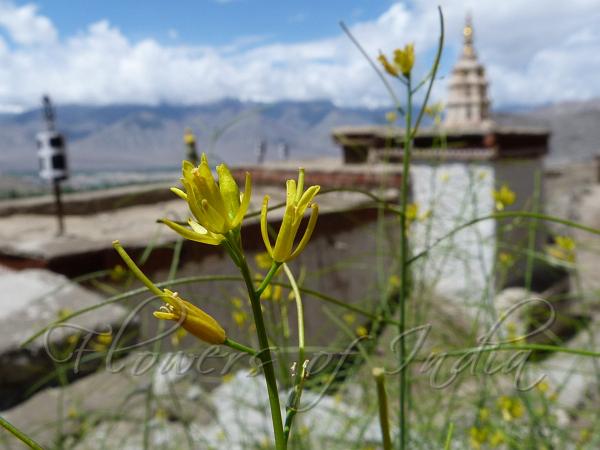|
| Himalayan Tumble-Mustard |
|

|

| File size | 237140 |
| Original date | 6/26/12 10:55 AM |
| Resolution | 1588 x 1191 |
| Flash | Flash did not fire, auto |
| Focal length | 4.5mm |
| Exposure time | 1/400s |
| Aperture | 5.6 |
| Focus Distance | |
| Metering Mode | Multi-segment |
| Camera make | Panasonic |
| Camera model | DMC-FZ40 |
| Sensor type | OneChipColorArea |
|
|
|
|
Photo: |
Botanical name: Sisymbrium brassiciforme Family: Brassicaceae (Mustard family)
Synonyms: Sisymbrium ferganense, Hesperis brassiciformis
Synonyms: Sisymbrium ferganense, Hesperis brassiciformis
Himalayan Tumble-Mustard is an annual or biennial
herb, 30-100 cm tall, erect, branched, nearly hairless. Lower leaves
are cut into many lobes like Dandelion leaves, rarely entire, shortly
stalks, terminal lobe ovate-oblong, distantly toothed. Lateral lobes
are smaller but similar, toothed to sub-entire. Upper leaves gradually
become smaller and linear, stalkless. All leaves somewhat fleshy.
Flowers are borne in 20-50-flowered sparse racemes, up to 25 cm long in
fruit. Flowers are about 5 mm across, yellow. Flower-stalks are 5-10 mm
long in fruit, spreading horizontally, slightly thickened. Sepals are
3-4 mm long. Petals are 6-8 mm long, 1.5 mm broad. Stamens are 3:5 mm
long, anthers about 1.5 mm long. Seed-pods are linear, somewhat
cylindrical, slightly downcurved, horizontally spreading, 5-10 cm long,
1 mm broad, hairless.
Himalayan Tumble-Mustard is found in C. Asia and Himalayas, in Tibet,
Kashmir, Ladakh Pakistan and Afghanistan, at altitudes of 900-4500 m.
Flowering: May-July.
| Identification credit: Tabish | Photographed in Leh, Ladakh. |